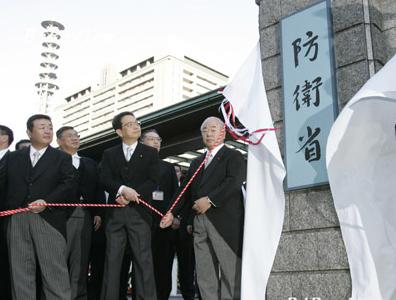
On January 9, the Japanese Government established a new ministry-the Defense Ministry-formally changing the military structure that had been in place for the last half-century.
This was not just a change in name, but a change in government structure. The bill proposed by the government to upgrade the Defense Agency into a ministry cleared a Lower House plenary session in late November and passed the Upper House in mid-December.
Prime Minister Shinzo Abe and new Defense Minister Fumio Kyuma attended a ceremony marking the change that was held in front of the Defense Agency headquarters in central Tokyo.
Abe said he was proud to be prime minister at a time when the Defense Ministry was established as the organization responsible for national defense, which is inalienable from state sovereignty, the Kyodo News Service reported.
The prime minister described the upgrading as the "first big step" and the foundation for Japan's "departure from its postwar regime."
The change reflects not only an upgrading of the power of the agency, but also the role of the Self-Defense Force (SDF).
The Defense Agency was established in 1954 and had been restricted in its activities by Japan's pacifist Constitution, promulgated after World War II. Its main tasks had been the defense of the nation and disaster relief at home. As an affiliate of the Cabinet Office, the agency was under direct control of the prime minister.
The powers of the new minister include the ability to call a Cabinet meeting and present budget requests directly to the Finance Ministry, powers that the head of the Defense Agency did not have.
Raising concern
Senior Japanese Government officials explained that it is necessary to upgrade the Defense Agency to a ministry so that it can better defend the country and contribute to the world peace in this new era, according to Xinhua News Agency.
However, some critics said the upgrade might imply a change of the defense-only policy to a more internationally active one. Overseas activities like peacekeeping, disaster relief and other international cooperation operations will become essential duties of the SDF, a change from their current subordinate positions.
Japanese analysts said that while there had been calls for upgrading the Defense Agency ever since its establishment, the idea had not become a reality for so long because of Japan's militaristic history.
Thus, the upgrade has caused concern. Hong Kong-based newspaper Wen Wei Po commented that the move was a breakthrough in the pacifist Constitution.
The newspaper noted that the right-wing parties are trying to rewrite the Constitution so that Japan can be a "normal country." However, if Japan uses this change to deny and neglect its aggressive history, which severely harmed its Asian neighbors during World War II, such a country will be "abnormal."
According to observers, it is understandable that with its strong economic position, Japan also hopes to have a bigger political role in the world. The international community would like to see a responsible Japan benefit more people in the world, but it remains wary.
The country has dispatched troops to Afghanistan and Iraq in the name of peacekeeping, and these military actions actually upgraded the SDF's duties. Now, with the establishment of the Defense Ministry, the SDF will be able to operate more freely in the international arena.
But analysts said that it is in a sense a betrayal of Japan's Constitution. "Once the pacifist Constitution is rewritten, Japan's next step will be to establish a formal army," predicted Lu Yaodong, a researcher from the China Academy of Social Sciences.
Previously, in the name of preventing a worsening nuclear situation on the Korean Peninsula, Japan spread a "defense line" not only close to Korea but also close to China's coastal provinces and the Taiwan Strait. Recently, some high-ranking officials in Japan have suggested a reconsideration of research on nuclear weapons. If the "second step" of the Japanese Defense Ministry happens, what will the country do? Where will Japan's military plan lead? How can it convince its neighbors that Japan is still sticking to a peaceful path?
Zheng Donghui, a researcher from the China Institute of International Studies, told Beijing Review that Japan's history remains a sensitive problem. If Japan goes further along the military route, no Asian country will remain silent.
| 